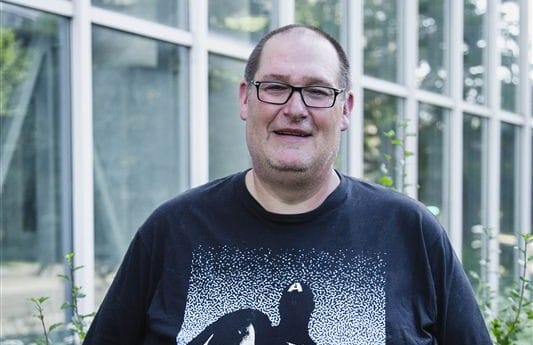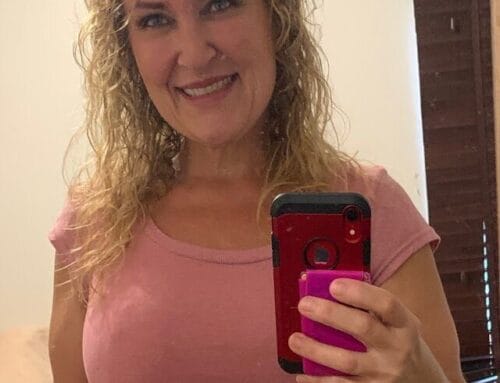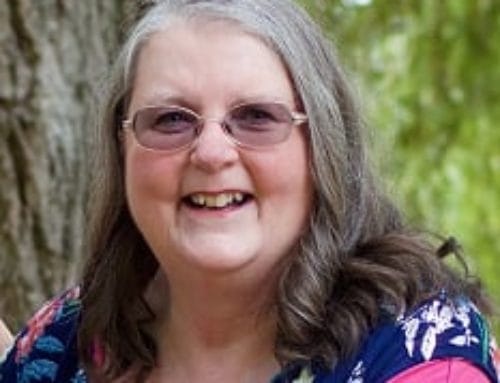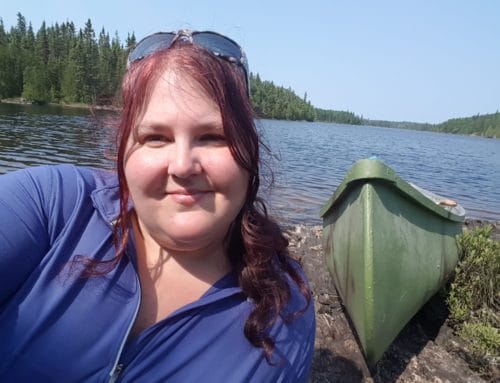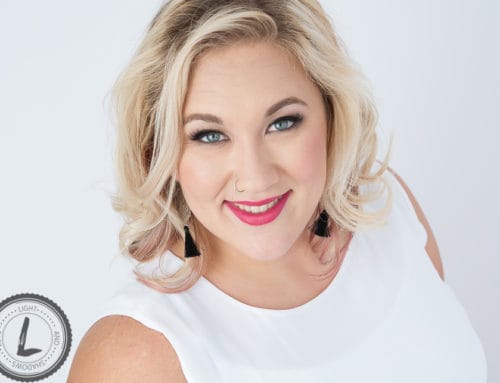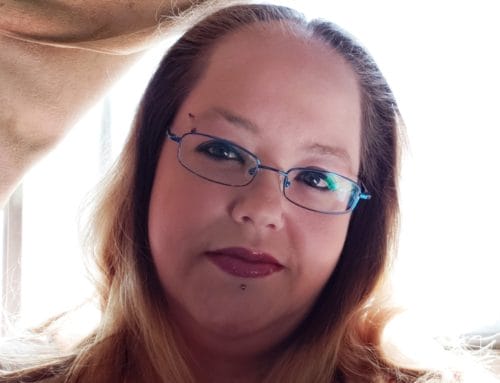How do you perceive your body? Do you feel like your perspective differs from that of society’s and how does it influence you in how you feel about yourself today?
How do I perceive my body? I perceive my body as normal. But the perception of the general public is that I’m not normal. It’s that I’m slovenly, that I’m lazy, that I’m fat, that I have no self control, that I’m a pig, that I’m a sloth, that I’m there to be made fun of. And that’s how society looks at an obese individual – they did this to themselves, they deserve everything they get.
Do you think that has affected the way that you have viewed your body, maybe in the past versus now?
That’s why obese individuals don’t speak up, step up. They’re the ones who are at the back of the family photos, hiding their shame that they’ve been taught to be ashamed of by society, by their families. They’re the discombobulated heads standing in the back of the family photo hiding their bodies so that only their heads are seen, they’re not really smiling- they are there because they were told to be there. They want to be invisible, that’s why they are at the back of the photo.
If you had a chance to tell other people living with obesity something, what do you think that would be, in terms of body image?
Accept yourself for who you are- don’t be categorized into a category the general public feels you should be in. Be comfortable with who you are, live your life, you only have one, you don’t even know how much time you really truly have, so you need to enjoy it- you need to express yourself- you need to be who you are. What a boring world it would be it would be if we were all the same size. If we were all the same size height wise, weight wise, colour wise, that’s the wonderful thing about the world is that we are all individuals and we all contribute. And wouldn’t it be shocking if it was an overweight, obese individual who came up with the cure for cancer-my gosh- the one that was beat down all the time – who cures it, you know you have no idea. An obese person doesn’t want to be treated any differently than any other person on this planet, an obese person wants to be treated with the same dignity, same respect, that any other person would demand and would expect, but it’s not what an obese person expects. An obese person expects to be beaten down. So I would tell them to stand up and be proud and celebrate who they are- but that’s easier said than done.
Can you speak of a time where you or someone else experienced discrimination or judgement because of weight or size?
It’s everyday. It’s the looks you get when you walk into a restaurant. Should a fat person be eating at a restaurant? You don’t have to hear the words, you can just get the look. I experience it every single day, it doesn’t bother me as much, but I’ve seen it thrown at other individuals over the course of a lifetime. I’ve lived this way for 38 years, so I’ve experienced it, I’ve lived it, I’ve watched others. One person at a time, you change people one person at a time.
Do you feel that your weight has created barriers for you? Have you ever given up on an activity or something you really loved because of your weight, or are there other ways that your weight has hindered you?
Absolutely, I think every person that lives life as an obese individual has been hampered by weight. Weight gets in the way of you getting a job, weight gets in the way of you properly exercising. Weight stops you from going to a gym – where you’re not welcome, where you’re truly not welcome – where you should be welcomed, but your not welcomed. You’re stared at, you’re looked at, you’re made to feel inferior, like why are you here? You’re not welcomed. Until you show them that you’re there for a purpose, but it’s such a daunting place that for years, I wouldn’t allow myself to go into a gym, because who wants to go into a place where they are going to make fun of you.
If the fear or barriers of weight discrimination were eliminated, would your life be different? What would your life look like if that wasn’t there?
My life is already there. But that’s not the case for most people, you know. You don’t become the Chair of the Canadian Obesity Network Public Engagement Committee without having stepped out of the box, that very safe zone that you live your life in. You don’t do that if you want to stay in your box. You come outside the box, and you say that life is worth living, and you want to affect change and you want to make change. You can’t do that in a box, so for me, it’s about getting busy living. I spent far too many years getting busy dying, and getting bigger – exponentially bigger over the course of many, many years to the point where there was a time where I was a 505 pound person. I’m about a 370 pound person, but I am still considered morbidly obese, and I’ve lost what? 135 pounds. It doesn’t matter because the general public still looks at me, the medical profession still looks at me as morbidly obese, they’ve nothing positive to say about me, but I am not going to let that define me. I am not going to allow anyone to define me – certainly not my weight. So I will stand up, I will speak up, speak out, and I will change opinions, one person at a time if necessary. That’s the goal, everyday, if I can just talk to one person, and have them look at it from a completely different perspective. I’m never going to change your bias, I’m never going to change how you were brought up. But if I can have you think from a different perspective, if I can have you understand what it is like to live life as an obese individual, you know, the challenges that an obese individual faces. I don’t want to be treated differently – I don’t. I just want to be treated the same as everybody else, afforded the same opportunities, afforded the same respect.
How did you come to a place where you found yourself out of the box, and not held back as much by that mindset?
The box is limiting, and when you see injustice in the world you want to speak up, but for me it was over time. It was over time that I could come out of the box, come out of the shell and live my life and not worry about what anyone else had to say. But it also came after being called every name that you could possibly imagine, and think of new ones, and think of colourful ones, anything that was not nice, I have probably been called it. You build a thick skin, and you don’t allow it to hurt you anymore. But I think my life, my journey into the dark world of obesity, is one of those that is shocking, but it is not unique. There are others that I know that have suffered the same that I have suffered to get to the point where you become a 505 pound man, where you don’t give a crap about anything, you just don’t.
The only thing that brings you comfort is food, and for me it was just a realization that I’m not going to allow anyone to define me anymore. I am not going to be afraid to walk into that gym – I don’t give a crap about what anybody has to say. I am here for me. But so many people like me don’t have that courage, they haven’t built up the ability to set aside what everyone is saying about them, and just be comfortable with who they are.
What do you think are some of the most common misconceptions about obesity, and how do you think stigma contributes to those misconceptions?
That we are gluttons, and that we eat, and eat, and eat with no control. I’m sure it would surprise you to know that I probably eat less food than you do in a day, but that would be a perception that we are lazy, that an obese person has no self control. That we don’t want to get out we don’t exercise, we don’t do anything. I think that to be told to “eat less and move more and you’ll lose weight. It’s all about getting more movement, getting more exercise. You wouldn’t be this fat if you were outside exercising.”
I don’t know how much more walking anyone would expect an obese individual let’s say carrying 500 pounds. When you consider that a 500 pound person, who gets up from a seated position everyday, is lifting 500 pounds every single day, and is moving those 500 pounds every single day. I walked from my parked car to the building, I moved my 370 pound body all that way. I’m not lazy, I’m not sloth-like, I actually get exercise every single day – about two hours of walking – every single day. I guess those would be the misconceptions and I would ask that people not judge anyone. You have no idea what their journey has been like, you have no idea how they got here, you have no idea what they’ve endured, none whatsoever. You have no concept of what it truly means to live life as an obese individual – you just don’t. And you could never put yourself into those shoes, you could try. I would challenge everyone, I challenge each of you to a week [of carrying] a 50 pound backpack. Carry it around for a week see how you feel at the end of the week, and you don’t get to take it off, you wear it 24/7.
How were the topics of self-image, weight and health discussed when you were growing up? How does this influence the way you think and talk about bodies and weight now?
The times were very different from when I grew up … I came from a home where my mother loved with food, an old Ukrainian lady, so we had lots of rich sauces, lots of deep fried foods and that’s the way it was and mom loved with food. We also came from a time where you didn’t leave the table until you ate everything on your plate. So I mean if you were stuffed you still had to eat everything you took, and if you took seconds and you couldn’t finish them, that wasn’t allowed, you had to finish what you took. So the times were different for certain.
I came from a home where my mom didn’t care about my weight. My mom was almost as big as I got to. I came from a home where I was one of five, an older brother, and three younger siblings that were triplets. Me and my older brother are 51 weeks apart to the day, we share the same mom and dad, and he was 5’2 and about 140 pounds. I’m about 6’3 and at my heaviest was about 505 pounds, we were raised exactly the same way. Why is he 140 pounds and why am I 500 pounds? I don’t know but my two sisters suffer from obesity as well, so 3/5 kids suffer from obesity, and that’s the way it is. Did mom say anything? No, mom encouraged – mom encouraged the craziness. [My mom would] go on a diet and you’d see that she was doing successful, it was crazy diets, but you’d see success. So you’d want that because you’re living life.
If you could talk to yourself when you were a teenager, or if you could talk to a teenager now who is living with obesity, what advice would you give them?
… I started gaining weight as a result of some sexual trauma that was inflicted on me for about 5 years, so I would love to tell myself to go and tell somebody, say something. I know I’m not the only person who has gained weight in that way, but I guess it’s very hard to speak up when you’re that old. But if I had the opportunity to speak to somebody that was my age now, I would want to encourage them. That if you can hear yourself in my story, my journey when I’m speaking, then I would encourage you to seek out help, see somebody. Even if your mom’s not listening, if your dad’s not listening, tell your teacher, because the times are different, the times are really different. What was acceptable then is not acceptable now.
And what would I tell myself? Easier said than done. That’s a hard question, because I just don’t think that you can pull yourself out of the muck that you’re in at the time.
I think if you can get the abuse to stop and you get intervention to stop the abuse, then perhaps the weight gain would’ve been stalled, whether that would’ve been a different way of looking at it.
I can’t change the past, I can’t change me, I can’t change the experience of life that I’ve lived. I can only learn from my experiences and that’s what I share when I speak – is that I was meant to live my journey, and I believe wholeheartedly that everything happens for a reason, and we all have our crosses to bear so to speak. I am not a religious man, but we all have our journeys, and I believe that we are all put here to do some task, to do something. And my purpose is to change how obesity is looked at, to change the conversation about obesity, to change other’s journeys about obesity, to change other’s thoughts about obesity. To have you look at it from a completely different perspective, to have you realize that I’m not different than you are – I’m really truly not. If you actually took the time to get to know me, you’d realize that I’m a pretty cool dude. My daughter’s friends think I’m pretty cool for a Dad. So that’s the goal – just change people one person at a time. Sometimes I get to change 400 people at a time, sometimes it’s only 20, but each day, that’s my goal – 1 person. Today I got 3.
Can you tell us about your journey and how you got here?
My journey has been shared so many times, I talk about my journey all the time, there has been many phases of my journey. As the work that I do with CON and the public engagement committee has increased, I’ve come to embrace the crappy side, the crappy part of the journey. Up until this last year, I have always glossed over the sexual abuse at the hands of a brother, always glossed over it, always said it was just a trauma that occurred between the ages of 12 [to] 17. Between the sexual abuse, the fact that we were in the same school together, and the threats of exposing what was happening, [it] scared the bejesus out of me. I didn’t want anyone to know, and he taunted and teased me at school. He was likable, he was perfect, he was the kid that everyone was friends with. He was good looking and I was not, he was thin and I was fat, and he made certain that every single friend of his knew that. He would lead the charge of name calling, so it happens right from home, and I could never escape it.
I would finish school, come home, and I’d cry in my bedroom. We shared a bedroom, and then I’d wait for supper, I’d eat supper, and I’d eat 2, 3 helpings- food brought me comfort. Finish supper, and then I’d walk to the corner store and I would buy a bottle of coke, bag of potato chips and a chocolate bar. And I did that every single day, for years and years, and into my adulthood, those are my triggers, they’re the things that bring me the greatest comfort. I would come back to my room, I would sit and watch television or I would put on my music which brought me the greatest comfort at all, and I would eat my goodies in the privacy of my bedroom.
And I didn’t give a damn that I was getting bigger, I was already fat. And it continued on until I was 17, till I graduated and he moved out, but at that time, in a 5½ year period I had gained about 200 pounds. I graduated at 17 ½, when I started junior high I was 150 pounds, when I finished grade 12 at 17½, I was 350 pounds. You know, they don’t make clothes for 350 pound kids, I walked across the grad stage wearing a grad gown that didn’t fit. Grade 7 to 12 I just had the most horrible times, if I could erase a time in my life, I would erase grade 7 to grade 12, and never have lived them. I have no positive memories, no memories I look back on and laugh. I have very few friends, I have two people that I still talk with from my high school days.
So move on and become an adult, I had two children, didn’t deal with the issues, continued to gain weight, and realize that I’m going to be a big guy. I get to about 32, got my first diagnosis of type II diabetes. I didn’t give a damn, I went to the classes, took care in the beginning, but 6 months or a year afterwards, it’s just, this isn’t going to hurt me, it’s just stupid. If there’s anything I wish I could do, it would be to go back and tell the 32 year old me, “you know what, you need to continue to check your blood because that is going to kill you”, and it caused more problems down the road, but you’re invincible at 32. You don’t realize that things are out of control until you have a mini stroke at the age of 38, and soon you’re on 14 or 15 different pills, you’re taking 50 pills a day for a myriad of problems- high blood pressure, type II diabetes, obesity, issues with your knees, issues with your hips. I was taking 40 mg of oxycodone 4 times a day for 2 years, just to move. I work in the crown prosecutors office, I run to court all the time, I’m a busy person, I never stopped, never stopped doing the things, but we are “lazy,” we’re “slovenly.”
So I had bariatric surgery at 42, so 8 ½ years ago. At my lowest weight loss, I lost about 160 pounds, and I gained about 35 of them back. So my journey is an up and down journey – it’s a roller coaster ride. I call it a work in progress, and there are good days and bad days, but coming to terms with the sexual abuse has certainly helped me to speak up and speak out.
I was already speaking up and speaking out. I think it was coming to grips with that one piece, the one piece that sort of helps define how you get there … But you know what, it empowers me now, I made a conscious decision. The brother that was sexually assaulting me, he died last year of a drug overdose, and he was a drug addict- he chose his path I chose my path. He could never apologize, he went into the 12 step program and it’s step eight or nine where you have to apologize and make amends, and he could make amends with everybody but me, so he couldn’t move on. He realized he had done wrong but he could never apologize for it so I just decided after he passed that [he’s] not in control of my life anymore, and I realized I needed to talk about it, I needed to share it… I went into therapy, and now I share it, it’s a part of the journey, it’s a part of explaining how you get from point A to point B and now I’m on to point C which is change the world.

